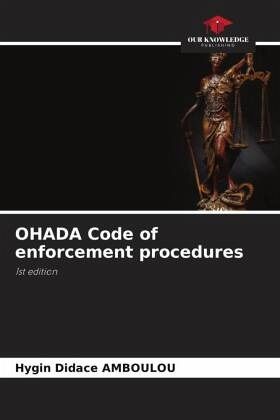
OHADA Code of enforcement procedures
1st edition
Versandkostenfrei!
Versandfertig in 6-10 Tagen
29,99 €
inkl. MwSt.

PAYBACK Punkte
15 °P sammeln!
Knowledge of civil enforcement procedures is particularly important. On the one hand, it allows the creditor to be clothed with his rights to seize the goods of his debtor. On the other hand, it prevents the insolvency of the debtor by carrying out seizures as a precautionary measure, i.e. even before any court decision. The law of enforcement, or the law of civil enforcement procedures, groups together all the legal and coercive procedures to which a creditor may have recourse to obtain the performance of his obligation by the debtor, if the latter does not perform freely, voluntarily and spo...
Knowledge of civil enforcement procedures is particularly important. On the one hand, it allows the creditor to be clothed with his rights to seize the goods of his debtor. On the other hand, it prevents the insolvency of the debtor by carrying out seizures as a precautionary measure, i.e. even before any court decision. The law of enforcement, or the law of civil enforcement procedures, groups together all the legal and coercive procedures to which a creditor may have recourse to obtain the performance of his obligation by the debtor, if the latter does not perform freely, voluntarily and spontaneously, i.e. if he does not show good faith. In the OHADA area, this right is the result of a reform carried out by the Uniform Act Organizing Simplified Collection Procedures and Enforcement Measures, adopted on 10 April 1998. This Code is devoted to this law of enforcement.Both by its clear and limpid expression and by the richness of its jurisprudential and doctrinal references, it brings solutions to the difficulties with which researchers, magistrates, lawyers, judicial officers, students and the general public are confronted.












